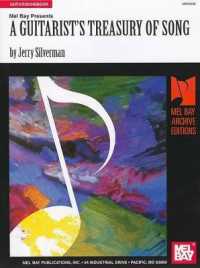- ホーム
- > 洋書
- > 英文書
- > Literary Criticism
Full Description
Perhaps no great poet, in any language, has suffered more than Byron from being merely read about rather than actually read. As Bernard Beatty remarks in his introduction to this important collection of essays, the popular conception of 'Byron' still often approximates to 'Rupert Everett with a limp'.
Reading Byron is the product and summation of nearly sixty years devoted to studying and teaching his poetry. It argues that, far from being 'mad, bad and dangerous to know', Byron is serious, ethically orientated and rewarding to read. The book is in three parts: Poems - Life - Politics. Five new essays have been written especially for the first and largest section, which provides fresh perspectives on Byron's major works. The volume continues with three of Beatty's lively lectures on unappreciated aspects of Byron the man, and three pithy essays on Byron as a complex, if not systematic, political thinker.
While Beatty does not question the pre-eminent status of the 'bright' Don Juan, devoting a chapter to an unconventional reading of its final cantos, he argues powerfully that nineteenth-century readers, who responded on an unprecedented scale to the forceful poetic structures of the 'dark' Byron in Childe Harold's Pilgrimage, The Tales, Manfred, and Cain, were right to do so. Introduced by Jerome McGann (editor of the great Clarendon edition of the poet's works) and concluded in dialogue with Gavin Hopps (co-editor of the forthcoming Longman edition), Reading Byron is itself essential reading for any student or lover of Romantic poetry.
Contents
Introduction (by Jerome McGann)
Author's Preface
1. Childe Harold's Pilgrimage: Types of History
2. Acts of Will: Byron's Lara
3. Understanding Manfred: The Sense of an Ending
4. Cain: One Drama, Two Theologies
5. Empty Spaces in Don Juan: A Reading of the Norman Abbey Cantos
6. 1814: Byron at Albany
7. 1816: Byron at Seaham
8. 1819: From Venice to Ravenna
9. Byron, Liberty and Licence
10. Byron and the Paradoxes of Nationalism
11. Byron as Political Icon
12. Bernard Beatty in Conversation with Gavin Hopps








